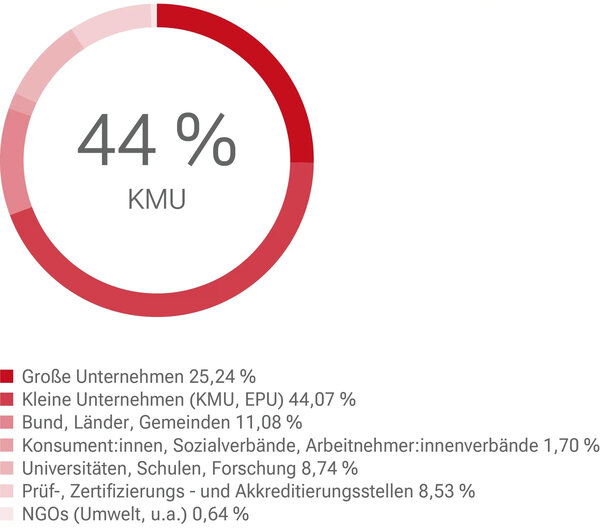SME report
About this report: Small and medium-sized enterprises (SMEs) are a key part of the economy, as around 95 percent of all European companies are SMEs. In Austria, as many as 99 percent of companies fall into this category according to criteria from the EU. Even though the relationship between SMEs and standardisation seems to be ambivalent, standards have particular importance for SMEs, just as SMEs have a key role to play in standardisation.
Standards give SMEs certainty: Anyone who is guided by and adheres to standards can be certain that their product or their service corresponds to the current state of the art and is therefore "marketable".
Standards provide SMEs with reliable expertise: Anyone who uses standards can access validated and recognised specialist knowledge, knows the requirements placed on their products and services and can provide evidence of reliability and safety using standardised test procedures.
Standards make market access easier for SMEs: They create fair competitive conditions – for companies big and small – thanks to standardised provisions.
Various measures have been taken at a European and Austrian level to make access to standards easier for SMEs and to make participating in developing standards easier for them. Austrian Standards provides insight into the current situation with its latest SME report 2023 and shows the areas in which improvements could be made.
How Austrian Standards plays its part in making improvements
Austrian Standards has developed numerous offerings over the last few years which make it easier for SMEs in particular to access standards and to get involved in creating standards. Up-to-date information on this is available on the Austrian Standards website in the section concerning offers for small and medium-sized enterprises: www.austrian-standards.at/kmu
Information about standardisation projects of relevance to SMEs
Up-to-date information about ongoing standardisation projects are particularly important for SMEs. In addition to its complete overview of all projects – "National Work Programme" – Austrian Standards has identified those standardisation projects which are particularly relevant to small and medium-sized enterprises separately since 2015. Drafts regarding ÖNORM standards and ONR rules which are currently open for public comment can also be found there.
Participation of SMEs in developing standards
44.07% of all companies and organisations which send participants to Austrian Standards committees and working groups are SMEs. They make up 63.60% of the "Business" stakeholder group. Compared to the 2022 reporting year, these percentages – in relation to other stakeholder groups – have slightly increased, both in relative terms and in absolute numbers, as has the participation of SMEs in developing standards – this is set against the general backdrop of an increased number of nominating bodies and specialist people sent by them in all other stakeholder groups.

No participation fees
The Normengesetz 2016 (Standards Law – NormG 2016) states that the standards body must not request any costs or participation fee to participate in standardisation. Since 1 January 2016, Austrian Standards has therefore no longer collected any participation fees.
ÖNORM drafts: free to view and comment on
For a while now, it has been possible to view drafts for ÖNORM standards free of charge via the standard draft portal from Austrian Standards during the official deadline for comments. Comments and statements can also be sent directly to the responsible committee as part of this process.
SMEs therefore have a particularly inexpensive option for getting involved in developing standards. They can also find out information about upcoming changes to standards which are important to them.
Advance information about the content of standards
Information about the content of standards is available via the Austrian Standards online shop. In addition to a summary of each ÖNORM, there is also a free preview of the first pages of an ÖNORM. SMEs can call up the cover sheet, table of contents, foreword and scope, and find out further information about the content of the standard.
Further possible information channels
In addition to its online shop, Austrian Standards offers additional options for finding out information about ÖNORM standards:
- Austrian Standards, Heinestrasse 38, 1020 Vienna
Monday to Thursday: 8:00 am – 4:30 pm | Friday: 8:00 am – 2:30 pm - Free viewing according to Art. 8 (2) NormG 2016
- Information and sales partners in the federal states
Special rates for standards and set of standards
With the industry solution meinNormenPaket, Austrian Standards offers a special service for SMEs. Over the past few years, trade associations have concluded special cooperation agreements with Austrian Standards for their members. These agreements offer easy and particularly inexpensive access to all ÖNORM standards relevant to them for small and medium-sized enterprises. A free update is included.
The new "Mein Abo" ("My subscription") service launched at the end of 2022 provides practical online access to all ÖNORM standards – for a fixed price. meinAbo is a digital service for companies, which regularly use ÖNORM standards. You can therefore access all current ÖNORM standards at any time and from anywhere for a monthly fixed price.
Start-ups, SMEs and cooperation
Additional measures which simplify using standards for SMEs and make it easier to help develop standards – at the end of 2016, Austrian Standards put together a special start-up package. It includes
- a free briefing,
- a free test access for meinNormenRadar,
- discounts for seminars and courses
- discounts on room bookings at the Austrian Standards Meeting Center.
In 2017, Austrian Standards also signed a cooperation agreement with three leading Austrian start-up network partners:
In the reporting year 2021, Austrian Standards signed a cooperation agreement with makerspace Happylab – the biggest maker community in Europe with over 2,000 employees in Vienna, Salzburg and Berlin.
Simplification of building rules
The "Dialogforum Bau Österreich – gemeinsam für klare und einfache Bauregeln" (Austrian Construction Dialogue Board – Working together for clear and simple building rules) is particularly important for SMEs who are active in the construction sector. The Dialogforum was set up in 2015 by Austrian Standards in cooperation with the Construction Federal Guild.
After the completion of the first phase in May 2017, the "Committee for Building Regulations" was set up in 2018 in the Executive Council of Austrian Standards International as a continuation of the Steering Committee of the Dialogforum Bau Österreich.
The aims are to cover the content of the various areas of construction, strategically deal with the latest issues, contribute to improvements and therefore to ensure long-term success.
Another main focus was the 5th virtual construction industry 'Baustammtisch' conference, which took place in 2023 against the backdrop of worsening damage due to hail, floods, storms and heat, and which dealt with the question as to how building shells need to be prepared for climate change and extreme weather.
In 2023, Austrian Standards also invited a number of experts to define sustainable and resilient solutions for the construction sector as part of the 6th Annual Conference for Construction Law and Construction Standards. Best-practice examples from real life were not just used to demonstrate hurdles and obstacles to sustainable projects, but also to illustrate perspectives for the future. The delegates agreed that in "stormy" times the construction sector is trend-setting – in terms of technological, social and economic developments.
More information on the Dialogforum Bau Österreich: www.dialogforumbau.at
Basis for the SME report 2023 from Austrian Standards
The regulation on European standardisation – Regulation (EU) No. 1025/2012 (PDF, 880 KB) – provides in Chapter II, Article 6(3) for the national standardisation bodies to publish a report on their website regarding their activities according to sections 1 and 2 as well as on all other measures which are intended to improve the conditions of use of standards by SMEs and their participation in the process of developing standards.
Article 6 "Access of SMEs to standards" of the EU Regulation lays out:
(1) National standardisation bodies shall encourage and facilitate the access of SMEs to standards and standards development processes in order to reach a higher level of participation in the standardisation system, for instance by
a) identifying, in their annual work programmes, the standardisation projects that are of particular interests to SMEs;
b) giving access to standardisation activities without obliging SMEs to become a member of a national standardisation body;
c) providing free access or special rates to participate in standardisation activities;
d) providing free access to draft standards;
e) making available free of charge on their website abstracts of standards;
f) applying special rates for the provision of standards or providing bundles of standards at a reduced price.
(2) National standardisation bodies shall exchange best practices aiming to enhance the participation of SMEs in standardisation activities and to increase and facilitate the use of standards by SMEs.



